#Visual and narrative callbacks
Explore tagged Tumblr posts
Text
I finally beat Shadow of the Erdtree's final boss.... it was hard but going slowly day by day helped learn most of the patterns (and survive the ones I still didn't get completely) ;;;;;;;; TIS DONE
#I have.... thoughts about it from a narrative standpoint but I think I need to rummage them a lil' before speaking#from a gameplay standpoint : I didn't like him as much as Gael or Malenia but it was very impressive visually#AND not that bullshit of a boss (except two (2) attacks where I'd like to speak with fromsoft lmao)#Gael remains unmatched in terms of “oh shit that boss is so cool and so fair” to me but hey#SotE's last boss had some visual theme callbacks from other fromsofts that I appreciated too hehe#anyways Imma go try to help some people now kmfjdgh#also I love the rakshasa armor so much omg it's PERFECT for Anma#i struggle with how much more squishy it makes you but the thematics of it ? perfect for her#yeah she's savage yeah she'll do more damage to tear you appart even if it costs her#she's probably be more skilled than how I play her anyway lmao#anyways rly glad I finally found an armor that I rly like for her hehe#both visually and thematically#chef kiss#elden ring#sote#elden ring sote#shadow of the erdtree#beary games#beary talk
9 notes
·
View notes
Text
I think it was a very fascinating and deliberate choice on the creators’ part to give the two people closest to Jayce—Viktor and Mel—the same imagery that evokes the mystery mage who helped Jayce when he was a child.



We see this visual callback first in Viktor, in Act I:


This makes sense, of course, once we know the mystery mage is Viktor—albeit a future version of himself. But what struck me is the fact that they also gave Mel Medarda the same treatment.

When Jayce first sees her after the awakening of her magic, he sees that image—a being whose mere presence caused his weapon to light up in recognition, paired with a robe covering their identity—and I think there’s a great possibility that he asked himself if this was the one; the mage who saved him when he was young.

Once she reveals herself, he visibly relaxes, and they reconnect. But the physical change in her is clear in her body language. She now moves like the mage in Jayce’s memory. She hides her face in her hood often, something she never used to do before. And her mannerisms are slightly different, which could easily be accounted for due to her not being used to the magic now alive in her body. But it’s the change itself that makes the viewer do a double-take.

It could just be that Mel and Viktor are the only mages we see up close in the series. Perhaps it is simply what happens when magic transforms their wielder in subtle, physical ways.
But I think the parallel holds narrative weight as well. The two people with the most affection and influence over Jayce both end up touched by the Arcane in ways that are both transformative and involuntary. The are changed after their bodies become vessels of magic.
I think that’s why the creators gave both Mel and Viktor the same iconography that would invoke a clear memory from Jayce’s childhood as the symbol that started him on the path to magic.
Viktor actually was the mystery mage from Jayce’s memory, and after the finale, the viewer knows why. But I think, implicitly, the point was that either one of them could have been.
#arcane#mel medarda#jayce talis#viktor arcane#jayvik#league of legends#arcane: league of legends#arcane spoilers#viktor#viktor league of legends#jayce league of legends#jayce arcane#jaymel#meljay#neo queen serenity’s posts#arcane season 2#arcane season two#arcane season 2 spoilers#arcane meta#arcane analysis#mel arcane#arcane viktor#arcane jayce#arcane mel
2K notes
·
View notes
Text
Kinktober - Day 6 - Sex Work
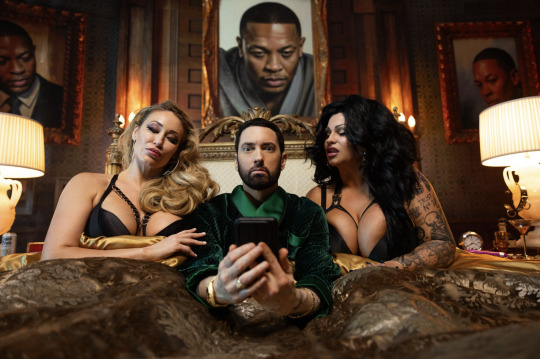
Kinktober 2024 Masterlist
A/N : For the "sex work" prompt of Kinktober 2024 I thought I'd mix it up with a request I received as well. Granted, it's playing on the words of the prompt rather than the actual theme but I hope you guys like it nonetheless ! ✨ Also, I did have a second idea, which I might end up doing too 😏
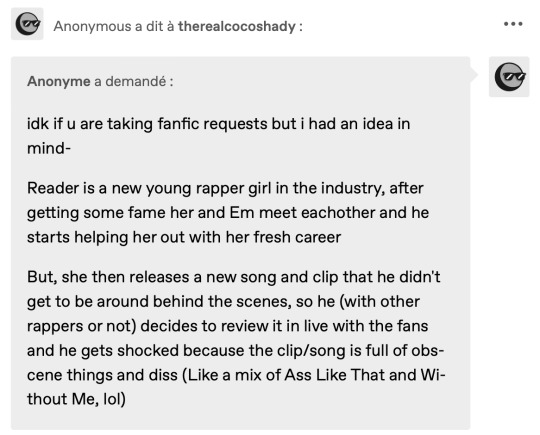
CW : Mention of sex work - Flirty texts - Mention of hook up
The studio was buzzing with energy as the podcast got underway. Marshall sat at the head of the table, wearing his usual hoodie and cap combo, arms crossed casually as he listened to the banter among the other rappers. One former D12 member had decided to launch a podcast and, when he was ask to be the first guest, he was happy to show up to support his friend. In the past years, he’d grown more and more picky when it came to doing interviews and appearances, but he was glad he did this, supporting his buddy and talking about hip-hop in general, instead of just him. It was much better than random journalists asking about his professional life. The conversation had flowed from the evolution of hip-hop to its biggest influencers, and now, they were moving into more contemporary topics—reviewing music videos from up-and-coming artists.
He wasn’t sure what to expect when they cued up the next video for review. When the host dropped your name, though, his head perked up. You, the firecracker of a lyricist he had been « mentoring » for a while now. You weren’t to Shady Records, but you had worked together enough for him to respect your raw talent and commendable work ethic. He had been kind enough to offer some guidance and even some beats from his vault, and while you were still making your way in the industry, you had already built a reputation as an outspoken voice in the game. You had a good rapport, too. In private, you’d shared more than just a few laughs, and there was a mutual admiration that sometimes tiptoed into the realm of flirtation—compliments exchanged, gazes held a bit longer than necessary—but nothing too serious. It was always playful, a line neither of you had crossed.
The host grinned, looking at Marshall. « So, this is Y/N’s latest track. It’s called ‘Sex Work’. You haven’t seen this one yet, have you? ». He shook his head, a little curious but still cool. « Nah, she didn’t send it to me. ». His friend looked at him and let out a laugh. “You’re in for a surprise, then”. The video started, and the beat dropped—a heavy bass line that immediately grabbed everyone’s attention. But it wasn’t just the music that made Marshall sit up a little straighter. The visuals hit hard. You were on-screen, dressed in bold, provocative outfits, your presence commanding the camera. The scenes shifted rapidly, moving through a series of sexually charged, daring shots. It was unlike anything you’d done before.
You were playing with the very imagery that dominated so much of hip-hop—the kind of objectification women often faced. Except you were not the object here. She was the one in control, flipping the narrative. The lyrics hit just as hard as the visuals, each line razor-sharp, calling out the double standards in the industry, using clever wordplay ad metaphors that drew a parallel between the music industry and sex work, too.
Marshall was caught off guard. The video was bold, even provocative. You were owning your sexuality in a way that was direct, unapologetic, and powerful. But then it hit him—some of the scenes were direct callbacks to his older videos. One shot mirrored the set of his “Superman” video, and in another, you were standing where one of his infamous adult actresses had stood, reclaiming that space. « Damn, » one of the other hosts on the podcast muttered, eyes wide. Marshall’s eyebrows shot up, but he didn’t say anything. Not yet. The lyrics kept going, and it became clear what you were doing—turning the tables on the misogynistic narratives you had been surrounded by as an up and coming female rapper. The video wasn’t just about sex appeal; it was a statement. You were deliberately playing with the same imagery that had been used to objectify women for decades, challenging it, and throwing it back in everyone’s faces. By the time the video ended, the room was dead silent for a moment. The host was the first to speak. « Marshall, man… what are you thinking? ». He leaned back in his chair, taking a breath. He could feel the eyes on him, waiting for some kind of reaction, maybe even expecting. You weren’t playing by anyone’s rules and it was the type of attitude he respected, especially then someone pushed the pen that far. « Well, first off, » he said, glancing around the room before locking eyes with the host, « she killed that ». The other guys laughed, but he wasn’t joking. « She’s always been fearless with her lyrics, » he continued, « but this? This is next level. She’s calling out the hypocrisy in the industry, and she’s doing it in a way that makes you pay attention. It’s bold as hell. » He paused for a second, gathering his thoughts. « I didn’t expect her to take shots at some of the imagery I’ve used in my older videos, but I respect it. She’s making a statement. She’s an artist, it’s what she should be doing. It’s what we do as emcees, you know ? ». The others nodded, clearly impressed with his take. « So you’re not bothered by it? I mean, some of those scenes were pretty close to your old stuff ».
« Nah, » he said, shaking his head. « If anything, I think it’s cool. That’s the kind of artist she is—smart, sharp, and always saying something with her work. Whether it’s a track about life or, you know… this ». He chuckled a little at the end, the edge of a smirk tugging at his lips. Truth be told, he hadn’t expected you to pull something this bold. Sure, you had always been outspoken, always ready to challenge the norms, but this? This was next-level boldness. The conversation moved on to other topics, but Marshall’s mind lingered on your video. He knew it was going to blow up and, truth be told, he was curious to know where that was headed.
The days following the release of your music video and Marshall’s appearance on the podcast were a whirlwind of noise. Social media was ablaze with debates, and hip-hop blogs pumped out articles almost hourly, all focused on one central question: Was Y/N dissing Eminem ? Marshall, sitting in the comfort of his home, scrolled through his phone, shaking his head at the ridiculous headlines. « Y/N’s Bold Move: Diss or Power Play Against Eminem?" or "New Queen in Town? Is Y/N Coming for Eminem’s Throne? ». Everyone had their own theory, and the conversation was only growing louder. What had started as you making a critique of misogyny had snowballed into a supposed rivalry between you and Em—a narrative the media had hungrily latched onto. It wasn’t surprising to anyone, though. Of course it was going to make for good headlines and farm engagement rates, even though it was a shame to have it take away from the main topic. Interviews, radio shows, podcasts—everyone was asking the same question: What did Eminem think ?
Marshall had been ignoring the noise for as long as he could, figuring people would see the bigger picture. But the hype refused to die down. Paul’s phone blew up with texts and calls, from journalists looking for comments to fellow artists wondering if there was any beef brewing. His team’s inbox was flooded. He wasn’t surprised that you were stirring things up—you were unapologetically yourself, always—but the whole “diss” angle? That was ridiculous. A week after the video dropped, Marshall finally caved. He knew he had to address it, especially after hearing that some major podcasts were going to dive deeper into the so-called "feud." There was no way he’d let anyone twist this into something it wasn’t. It was sort of unlike him, but he was pissed off about lies being spread and people making headlines about an imaginary feud. He wouldn’t have cared to address it if it had been anyone else, but he actually liked and respected you. He also had enough self-awareness to know that, if he let the whole thing escalate, some people would take « his side » and turn on you. Frankly, he didn’t have the time or energy for some stupid quid pro quo situation and he deemed it best to address the topic.
That morning, he agreed to hop on a Shade45 radio show that had been asking him for a statement for days. As the interview started, the host wasted no time jumping into the topic. « Alright, Boss, we’ve got to get straight to it, » the host said, his voice filled with anticipation. « Y/N. We’ve all seen the video. She’s been pretty outspoken, and a lot of people are taking her comments about the double standards in hip-hop and the scenes from your old videos as… well, a diss. What do you think? ». Marshall took a deep breath and leaned forward into the mic, choosing his words carefully but keeping his usual bluntness. « Look, » he started, « Y/N is not dissing me. She’s not coming for me or trying to take shots. What she’s doing is making a statement. A damn good one, too. People keep saying she’s going too far or whatever, but this is the same stuff that I, and a lot of other artists, have done for years. She’s just flipping the script, and now, suddenly, people want to act like it’s a problem ». The host nodded, but there was still an edge of curiosity. « So, you’re not offended by her recreating some of your visuals? Some people took it as her calling you out ». Marshall smirked, shaking his head. « Nah, man. Y/N’s one of the most talented artists out there right now. She’s smart. She’s sharp. And she’s not afraid to say what’s on her mind, even if it makes people uncomfortable. That’s what makes her great. She’s doing exactly what artists are supposed to do—make people think, make people talk. It’s the same shit I have always done with my music. And if she’s calling out hypocrisy ? Good for her. I’ve been there. I know how that goes ».
He leaned back again, more comfortable now. « You know, I’ve worked with her, produced a couple of tracks for her, and I’ve always been impressed by how real she keeps it. She’s not here to play by anyone’s rules. She’s doing what she wants, and I respect that. If you’re mad at her for being direct, maybe it’s because you don’t like what she’s saying ». The host paused for a moment, letting Em’s words settle. « So, to be clear—you fully support what she’s doing? ». « Yeah, » Marshall said without hesitation. « Y/N’s just getting started, and if people are mad now? They better buckle up, ‘cause she’s only going to keep pushing boundaries. She’s not afraid to call out the industry for its hypocrisy. And if anyone thinks she’s dissing me, they’re missing the point. She’s making space for herself, and she’s doing it her way. That’s what being an artist is all about ». The host grinned, seemingly satisfied with his take. « Well, there you have it, folks. Marshall’s got nothing but respect for Y/N. » Marshall chuckled, nodding. « Damn right. I’ll say this though : I’ve spent enough time with her to know that it’s more fun to be her friend than to be her enemy. So, anyone who’s been talking shit… Better be ready ».
After the podcast dropped, the noise around the supposed « diss » started to die down. Marshall’s words carried weight, and now that he had set the record straight, the media was forced to pivot. Instead of focusing on a non-existent feud, the conversation shifted toward what you had always intended—your critique of double standards. Now that people didn’t worry about a possible feud, they seemed more disposed to focus on the subject matter and the narrative surrounding you quickly took a much more positive turn. That evening, Marshall was sitting in his home studio, tweaking some beats when his phone buzzed on the table next to him. He glanced down and saw your name on the screen.
Y/N : Thanks for having my back.
He stared at the text for a moment, the corner of his mouth lifting into a smile. He wasn’t surprised you’d reached out; after all, you weren’t the type to let things go unacknowledged. He liked that about you. But he could tell by the simple message that you appreciated the support more than you’d probably say out loud. He picked up his phone and tapped out a reply.
Marshall : Always. Not that you needed it, though.
He fully meant it when he said that you didn’t need his support. He knew for a fact that you’d clap back if needed. There was a brief pause before your next message popped up.
Y/N : Yeah, but you saying it shuts up a lot of people.
He chuckled to himself, nodding as he read the words.
Marshall : Let ‘em talk. You’re doing your thing. If they’re mad, that means you’re doing something right.
Y/N : Guess I learned from the best.
Marshall leaned back in his chair, looking at your message for a second before typing a final reply.
Marshall : Nah, you’re making your own lane. Keep killing it.
He put his phone down, guessing the conversation was probably over for the night. But even as he turned back to the track he was working on, he couldn’t help but feel a certain sense of pride. You were carving out your own space in the industry, no matter how many people tried to twist her message or pit you against him. In the short while he’d known you, he had seen you evolve as an artist and, since you’d never failed to share how much his music had shaped your artistry, he felt proud.
Y/N : Also, I’m glad that you got what I did with the references to your video. It was an hommage, not a shot.
Marshall grinned, running his thumb over the screen as he typed his reply.
Marshall : Oh, I know. But now I’m thinking, if it was an hommage, why didn’t you just ask me to be in it ?
The dots on the screen danced for a moment, and then your reply came through, as sharp as your lyrics.
Y/N : I was only hiring professionals. ;)
Marshall laughed out loud, shaking his head. He liked your quick wit, the way you never backed down from a little back-and-forth. If anyone else had thrown that line at him, he might’ve let it go. But not you.
Marshall : You don’t think I’m professional enough?
Y/N : In music ? Sure. Can’t speak for the rest, though.
There was a pause as he crafted his next response, his smirk growing wider. He enjoyed it too much, couldn’t help himself.
Marshall : If you want to find out just how professional I can get, all you gotta do is ask.
He sent the message, leaning back on his chair. He could practically feel the heat of your flirtation building through the screen. You didn’t take long to reply, as bold as ever.
Y/N : Oh, I’ll keep that in mind.
There was no more texting that night, but the tension lingered in the silence that followed. Your dynamic had always teetered on the edge of something more, something neither of them had fully explored. Both of you had always kept it on the safe side. The energy between them you felt charged in a way it hadn’t before, following these texts and he liked it. There was something irresistible about a beautiful woman who was also smart and bold. However, he chose not to let it get to his head, not wanting to be that guy. Being a woman in a male-dominated industry, you probably had enough of those, even though he wouldn’t mind showing you the extent of his bedroom skills. He meant it, though. All you had to do was ask. He had made a point to avoid getting involved with celebs and fellow artists but he’d gladly make an exception for you.
Weeks later, the two of you found yourself in New York for an awards show. The ceremony was everything you’d expect—long, loud, and full of celebrities. But Marshall wasn’t really focused on the stage. He hadn’t seen you yet, but he knew you were there. He’d heard your name more than once as people in the crowd gushed about you, your bold video, and the statement you’d made in the industry. Your viral video had made you gain tons of recognition and everyone was gushing about you, even the ones who had been quick to assume you were dissing him in a desperate clout-chasing attempt. After the show, as he headed back to his hotel room, he felt his phone buzz in his pocket.
Y/N : Nice performance tonight. Very professional. The Bradford. Suite 1602. If your offer still stands.
Marshall stopped dead in his tracks, staring at the message. The directness of it sent a jolt through him. There wasn’t any question about what you were implying. The words lingered on his screen, bold and unflinching, just like you. For a moment, he just stood there, processing. Then, without a second thought, he found himself heading toward the exit of his hotel. There was no hesitation now. His heart picked up speed as he walked out into the night, flagged down a cab, and gave the driver the name of your hotel, not too far from his. The drive was short, but each second felt drawn out, like anticipation was pulling time apart. As the cab pulled up in front of The Bradford, Marshall stepped out, the city lights glowing faintly around him. He walked through the doors and headed straight to the elevator, heart pounding just a little harder with each passing floor. When he reached your floor, the quiet of the hallway contrasted sharply with the rush of energy coursing through him. He stopped in front of Suite 1602, staring at the number on the door for a moment before knocking, his mind running through the million ways this could go. The door opened slowly, and there you were, standing barefoot in a simple yet alluring outfit that somehow made his pulse race faster than anything you’d worn in that music video. Your eyes met his with the same fire he’d always admired, but now, it was mixed with something more, something unspoken between the two of you that had finally found its moment. « Wasn’t sure you’d actually show up, » you said, your voice low but teasing. Marshall smirked, stepping inside. « Told you all you had to do was ask ». You grinned back, eyes glinting as you shut the door behind him. « Well, I am asking ».
If you liked this and want to support a struggling student, you can buy me a cup of coffee. ☕️
#eminem#marshall mathers#slim shady#eminem fanfiction#eminem x reader#eminem imagine#marshall mathers x reader#marshall mathers imagine#kinktober 2024#kinktober prompts#kinktober#eminem kinktober
165 notes
·
View notes
Text
One thing I really like in Dead Boy Detectives is the use of blood/gore/horror. With a TV-MA rating, a show with horror themes is obviously going to have some blood and violence, and there are clear instances if this in DBD, but while it's definitely there, it's almost never gratuitous. That's because scenes like the Devlin murders or Maxine's death aren't really about those deaths, rather, they're about the characters' reactions to them and the way the story is shaped by them.
In the Devlin house, the camera focuses not on the girls being killed but on Edwin, Crystal, and particularly Charles reacting to their murders with horror, shock, and anger. The blood splatters in a meaningful way, rather than simply a horrifying one, over the TV and the popcorn and the younger daughter's stuffed rabbit, tarnishing the innocence of everything it touches. While the tragedy of the murders themselves are important, the main focus is Charles' reaction to them as a result if his own trauma. Showing the minutia of the killings would take away from that, so it simply isn't there.
Even Maxine's death, while definitely played off more for shock value than the Devlin murders, serves a purpose. Episode 5 focuses on the failure of romantic relationships, on betrayals from those you thought you could trust, and the Maxine subplot adds to that. It begs the question, who can you trust in this world? At the end of the episode, the answer we are given is your friends, your found family, because love will kill.
It seems to me that the blood in hell represents the guilt of those it touches - Simon's wounds heal when he forgives himself; Edwin loses the blood covering him after Charles turns up to rescue him (albeit by a horrifying cause); the people in the Lust room are drenched in blood and get it on Edwin when they try to drag him down. It's not just there to demonstrate the horrors of hell, but to brand its inhabitants.
There are lots of other examples. The blood when Niko dies is there obviously because that's what happens when you get stabbed, but also (in my opinion) as a visual callback to her saying that red is the color of courage. The cat king's bloody corpse and Monty's blood-splattered face show Esther's ruthlessness and disregard for anyone in her path. Lilith is covered in blood as a symbolic part of her character design. Everything serves a purpose, narratively or symbolically.
(The only example of gore that served no particular purpose that I can think of was in episode one when the WWI ghost drooled blood all over Charles' face, but it was the pilot episode and that whole scene was meant to be shocking, so it can be forgiven.)
Anyway, I really like the way they use blood in DBD, because it shows such a level of detail and care. I enjoy horror but not gore so much, and to me it's refreshing to see it used so tastefully and executed so well.
#all of my well thought out text posts turn out way longer than intended#sorry guys the adhd said I wasn't allowed to shut up#dead boy detectives#charles rowland#edwin payne#crystal palace#maxine#devlin house murders#niko sasaki#thomas the cat king#monty the crow#esther the witch#dbda spoilers
203 notes
·
View notes
Note
do you know of anything with a similar "clockwork storytelling" style of plot development that you used to described act 5 in hymnstokes?
I'm glad you asked this, because this is a concept I've kept in my mind for a long time.
The most obvious well-known examples of clockwork storytelling that come to mind are the films of Edgar Wright, with Hot Fuzz in particular standing out. Edgar Wright's style is that every detail and line of dialogue, no matter how seemingly inconsequential, comes back later to mean something more than it initially seemed. There is no wasted space, nothing extraneous or unneeded. It is all extremely tight and extremely satisfying to see play out.
Film in general, having significant restraints in terms of length, is often subject to this style, though at differing levels of complexity. What is so exciting about Act 5 of Homestuck is that it manages this style while juggling a zillion different characters and plot threads, so when the pieces all slot together it has the sprawling sense of a symphony with hundreds of individual performers working together at once. But I would argue that even something like, say, most Pixar films follow an ethos of extremely tight plotting with minimal extraneous elements. Pixar operates at a smaller scale, so it doesn't overwhelm with magnitude the way Homestuck does, but it still creates that feeling of satisfaction via structural perfection.
Another good example is Rick & Morty. Dan Harmon is an Edgar Wrightian who has his own personal "hero cycle"-style plot structure he likes to stick to, and that level of plotting is on display in most episodes of the first few seasons of the show. What makes R&M an interesting example, though, is the intrusion of Justin Roiland's influence. Roiland is like, a dumbass stoner whose storytelling ethos seems to be to adlib goofy noises into a mic, which is completely at odds with Harmon, but it complicates the otherwise simplistic story template and wound up creating some of the show's most quotable moments (wubba lubba dub dub).
I like works that fuse intricate and satisfying plotting with bizarre and difficult-to-grasp or even contradictory aesthetic decisions like that. My two favorite anime, Puella Magi Madoka Magica and Blood-C, both fall into that camp, and both times it's due to the utterly opposite aesthetic dispositions of the show's respective directors and writers. Madoka, for instance, balances Gen Urobuchi's tight, almost mathematical plotting (the show has a major plot development nearly every 3 episodes on the dot) with Akiyuki Shinbo's surreal and eccentric visual style. The visuals wind up complicating what would otherwise be a perfectly-composed but possibly quite dry narrative. Blood-C, a less well-known show, similarly combines a rather simple narrative by CLAMP -- where every event and line of dialogue gestures toward a major twist revealed at the end of the show -- with a manic, sleazy gorefiendery from Tsutomu Mizushima, the director of Bludgeoning Angel Dokuro-chan.
When it comes to clockwork narratives at the scale of Homestuck, it's harder to find examples. Of course, Homestuck is itself faking being a clockwork narrative, which I think I talked about in my old Hymnstoke posts. Homestuck's style is to simply toss out so many details that even by calling back to only a third of them it creates the impression via volume alone that it was all planned out and deliberate. A great example is John's toy chest. It contains some items like the Sassacre book that have a recurring purpose in the narrative, some items like the trick handcuffs that have one notable callback use (when John's Dad escapes captivity using them), and some items that only briefly reappear in the background of later panels. It also contains one item, the fake blood capsules, that never show up again (at least John's fake blood capsules don't; there are some fake blood capsules used by Dave's Bro during the whole puppet Saw misadventure). Hussie has only really meaningfully called back to a few of these details, but has created the impression he has called back to a lot of them, because there are simply so many.
In reality, Homestuck, even Act 5 Homestuck, is laden with extraneous and useless details. Most of the trolls are useless, which is why so many of them are glibly killed off. I used to think the only truly important troll to the narrative was Vriska, and by extension any troll that was important to Vriska, such as Terezi. Now, though, I realize that Vriska's breaking-the-game-for-personal-satisfaction shtick was hijacking Rose's whole bit. Rose was constantly seeking ways to break the game or exploit its boundaries. This ultimately culminates in nothing. Rose goes "grimdark," a completely meaningless state that causes her to be goth for a scene or two, and then that's over with and she becomes an essentially ancillary character for the rest of the story, useful only for a few bits of exposition. Even if we ignore the Act 6 part of that, it's a completely pointless set up with no payoff. Rose questioning the game and trying to break it leads nowhere. All the important game breaking is done by Vriska.
I think you could easily do a troll-less rewrite of Homestuck where the only major difference is that Rose is the one who creates Bec Noir instead of Vriska. It's true that the trolls frequently give the kids exposition that guides their actions, but the story has so many sources of exposition -- the sprites, random writing on their planets, Doc Scratch, their own future selves -- that you could easily fill the gaps they leave. That's the other way Hussie fakes a deliberate and satisfying clockwork narrative: redundancy. Hussie can have 100 characters who all "feel" like that have a role because many characters are all basically doing the same thing. I think I once said, in a spiel about database-driven storytelling, that Hussie wrote similar to how he coded. If you ever looked at the HTML of the old MSPA site, I might have been more right than I knew...
This all probably sounds quite harsh on Homestuck, but I think even creating this illusion of unity at such a large scale is impressive. Compare to a lot of the long-running shounen, which accumulate hundreds of characters who are relevant for their introductory arc and then become part of an increasingly gigantic crowd of tagalongs who are lucky if they even get to say a line now and then to remind the audience they exist. Hussie used the (at the time) brand new concept of the "meme" to accomplish a lot of this aesthetic clockworkery. The most common callbacks in Homestuck, after all, are repeated lines from Sweet Bro and Hella Jeff. The redundancy in characters and details helped the work's internal meme language because memes tend to disperse by being templatized and reused in a variety of similar-but-different contexts. In a normal story, you might see stairs several times, and not think anything of it. But in Homestuck, the concept of "stairs" is memetically meaningful. If stairs show up, you better be sure you'll soon get a memetic callback. A bunny? There's a bunny? Oh shit. You better put it back in the box. In this paradigm, a character being similar to another character, almost to the point of redundancy (i.e. Dave and Davesprite and Dirk), is aesthetically unifying, rather than pointlessly promulgating.
58 notes
·
View notes
Text
CSM Chapter 195 analysis
So... chapter 195.
The chapter starts by breaking last chapter visual symbolism: in 194, we had a very clean line of "destroyed vs intact" in the buildings, creating a wall between Asa and Denji. Now, the perspective that made that possible is shattered, and we get this panel that only shows destruction, with a hole highlighting Asa's (Yoru's) finger as the source.

After Asa's attempted suicide, get to this "revelation"

There are two possibilities here:
Asa is telling the truth. That means Yoru isn't just fucking around, and she's got an actual plan, which is even scarier than Death Devil somehow. This would make the possibility of her being the Main Antagonist higher (right now the top contenders are Death, Fire and Yoru, and maybe Barem).
Asa is lying so that Denji kills her. The evidence supporting this would be Yoru's personality (she doesn't seem that cunning nor secretive).
That last line of dialogue might also mean she will stop colaborating/having a relationship with Fami whatsoever, which could make the possibility of Fami as an active antagonistic force (which is already high) even bigger.
Then, after Denji does try to kill Asa, we finally get a conversation between them, with a clear callback to the Aquarium Arc (specifically chapters 115-116):

The conversation is... weird. I've seen comments of people calling it underwhelming for a scene with such build-up, or saying they don't like the direction their relationship is going to. Although I understand it, I think it's important to remember CSM isn't over. We are judging the story based on isolated scenes when we don't have the bigger picture yet. There's still time to develop stuff, or subverting the current direction of plotlines. That said, let's dive into this isolated, bigger-pictureless scene:

Right now, Denji seems to be dragging Asa into the nihilistic devil-like mindset he's adapted, which is of course bad, but it'll probably calm down her suicidal thoughts for at least a while (the iterated transitions from horrible mindsets to "still horrible but slightly better, maybe?" mindsets seem to be the tendency in this manga).
He is still acknowledging Yoru over Asa, though. "Right now, we're havin' fun". Asa's not, Yoru was. And neither Asa or the narrative is really talking about how much he's disregarding Asa's feelings with the way he's interacting with Yoru (even if he himself is also a victim).
After that interaction, we change scenes.

It is revealed that a lot of people are evacuating Tokyo (logically), which is probably the reason Yoru's kill count, as stated in last chapter, is so low despite all the destruction. Also, I must admit that, until the page turn, I thought the transfer student was going to be Reze. 😔
In any case, who we actually get is this new character, who looks very much like Fami's friend from last chapter (also transfem Denji).

Okay, so, who is she? She's got the Horsemen eyes, so she's either...
The Death Devil. Pretty self-explanatory. The evidence against it would be that the Death Devil isn't supposed to come until a month passes, according to Nostradamus' prophecy. This theory could work, however, if she's in some sort of Asa-Yoru situation: the Death Devil like a parasyte, and it will "come out", as in take control of this girl's body, in a month. If this is the case, the body indeed could be that of Fami's friend, and Fami's involved in this (that being the actual reason she wanted to do the festival). Another piece of counter-evidence would be Yoru's comment a few chapters ago: "when the Death Devil makes an appearance, the high-ranking Devils greet her". That's not happening, or at least not yet (unless Fami going to the school festival is her "greeting her").
The Control Devil. When Makima died, The Control Devil reincarnated in a 6 years old child, so it seems that it basically "spawns" with a random age. If this is the case, then Nayuta's death would be 100% confirmed. I think this post by @sugar-grigri also makes a very good point on why it'd be the Control Devil.
Pestilence. The horsemen that got replaced by Conquest (Makima) in some interpretations, and who has never been mentioned in the story so far. Illness is a big fear, so she'd be on par with her sisters. Not very probable, but also not impossible.
Fami's pawn. Basically Fami starved her friend and turned her into a pawn (as she stated she can do in chapter 131). We don't know how that ability works, so it could give the pawn the Horsemen eyes. Also, that'd be classic Fujimoto baiting.
#csm#chainsaw man#chainsaw man part 2#chainsaw man analysis#csm 195#csm195#chainsaw man manga#csm spoilers
53 notes
·
View notes
Text
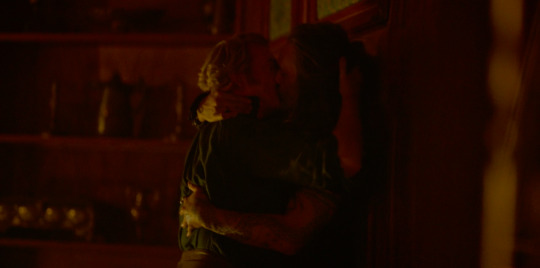
So, this is shot in a mirror, right? Specifically, this mirror--

--although they might have cheated the angle to get the kiss shot.
It goes by super fast, but you can see a bit of the gold frame, out of focus on the right edge of the screen:
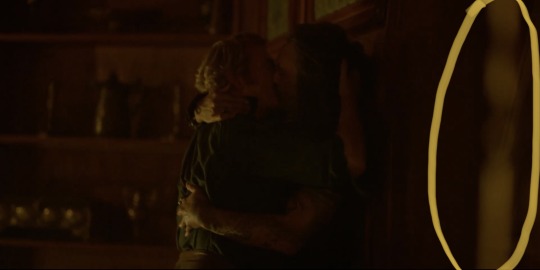
Cool trick! But why?
I think there's a few things this shot achieves.
One, it creates the sense that something is just slightly off. Even if we don't clock that this is a mirror shot (it took me a bunch of watches to figure out that was what was going on) your brain is going to register the flipped image as slightly not what you expected. The screen direction of their movement is wrong--in the shot where Stede pulls Ed into the room, they're moving from screen right to screen left, so we expect them to continue that motion, but because we're seeing it in a mirror they're now moving screen left to screen right. All this adds up to make the moment seem slightly off-kilter. It's a bit of visual foreshadowing: while this is a passionate, intimate moment that they both want, Stede and Ed are not on the same page, and that becomes an issue in the next episode.
Two, a visual trick like this often has the effect of calling attention to our position as the audience. It can create a slightly voyeuristic effect that reminds us that we are outside viewers, looking in on the narrative the characters are experiencing.
I think this shot has much the same effect:
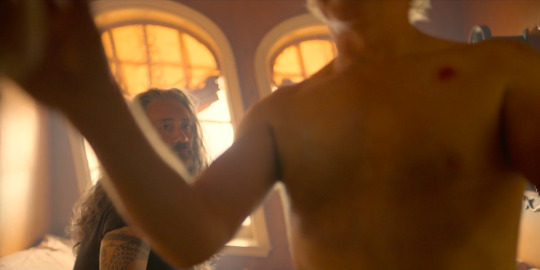
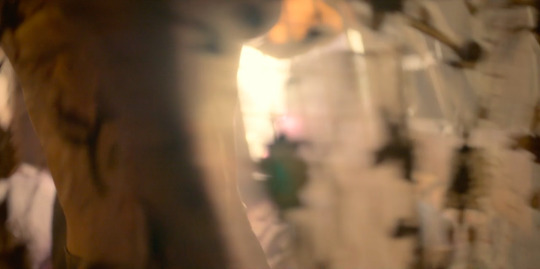
It's an unexpected framing choice that makes us feel like we are catching a glimpse of something not set up for the audience to see, lit only incidentally by the fireworks, and it ends with Stede literally drawing the curtain between the characters and the audience.
There's another notable place where a mirror shot is used in the show, and it's here:
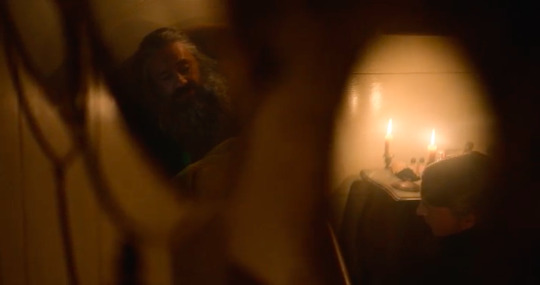
I don't think this is a coincidence (and not just because both episodes were directed by Fernando Frias). This is a very intimate scene between Ed and Stede--maybe more intimate than their actual kiss later in the season. And while it's mostly shot in a fairly conventional manner, this shot almost makes it feel like we're spying on them while they have a very vulnerable conversation.
There are TONS of parallels between 1.06 and 2.06, which I may make a separate post about, but this one is a particularly striking visual callback. In both cases, the effect is to make us feel like we are peeking in on a private moment between the characters that is not set up for our consumption.
446 notes
·
View notes
Note
SO CURIOUS what's your thoughts fr do you think we r getting kelvin and keefe proposal/wedding before the end of the show... my heart says yes + there's 2 episodes left and i feel like it would be sweet to end the show on a big family event where everyone is involved and lots of dramatic shit will inevitably transpire.. or are we delusional
hopefully this doesn't come back to bite me, but there's pretty much no question in my mind that we will get a proposal and/or wedding. with still two episodes left, kelvin's character arc has already essentially ended in terms of his internal conflict and the top christ following man win, but he's not quite done yet! narratively, his arc needs to come full circle from the conversation he and keefe had in 04x02 by fully committing to keefe and giving him exactly what he wants out of the relationship after so patiently supporting kelvin through it all. without that, i would be very confused about why they would even include that initial scene between them where keefe expresses his desire to marry + the visual emphasis on kelvin's hands/rings. the show loves a callback—i mean, even the jetpacks were brought back in a meaningful way (. ❛ ᴗ ❛.)
i simply think that the writing for kelvin has been way too good this season to leave that final thread hanging, and i am feeling extremely confident we are not delusional and we will not be disappointed ♥️
#the righteous gemstones#kelvin gemstone#keefe chambers#trg#kelvin x keefe#gembers#righteous gemstones#ask
33 notes
·
View notes
Text
Searching for Love and Identity: An Overanalysis of the Llamas with Hats Epilogue
tl;dr LwH is a huge tragicomedy, and Carl is a profoundly complex human monster who ultimately proves able to transcend his cookie-cutter cartoon villain character because of his painfully human desire for love.
I’ve been obsessed with the Llamas with Hats (LwH) Epilogue that released recently. I don’t usually do this, but here’s a super extra, over-the-top deep dive into the symbolism of the episode and what it reveals about Carl’s character. It's not super edited but I hope at least somebody enjoys this.
At the beginning and end are mirrored scenes: a scene of rippling water and a typical funny episode of LwH on a phone. While the water is a callback to the ocean Carl jumped into in Episode 12, the use of the phone to frame the episode emphasizes the nature of LwH as a show; it’s telling you that none of this is real and making a meta joke, since most of us are probably viewing this on our phones (and also long-dead if we were in the world of LwH).
For many of us who grew up with LwH, this is a nostalgic moment and a recap after not having watched the series for so long. What I really love about this scene is that Jason Steele uses these scenes—the water, the playing phone—to bookend Carl’s emotional journey, making the epilogue a complete narrative circle. But I’m getting ahead of myself.
In the next scene, we are shown the wake of Carl’s utter devastation upon the Earth, accompanied by a melancholic saxophone track, bringing us back to the end of Episode 12. Surprisingly, we actually know that Carl plays the saxophone, since he mentioned it in Episode 4. As he sinks into oblivion, his hat floats away.
WHAT'S UP WITH THE HAT?
Hats are a powerful symbol in Llamas with Hats. It’s right there in the title! A red hat and a green hat are often used as a visual synecdoche for Paul and Carl, respectively. In a broader sense, clothing is associated with civilization and dignity, that which sets us apart from animals. In the Christian Bible, when Adam and Eve ate the forbidden fruit of knowledge, they realized that they were naked and began to cover themselves up.
The hats make up a part of Paul’s and Carl’s identities as important characters; they’re not just llamas, they’re llamas with hats. It’s a core part of the series identity.
Another notable element is that Paul has a red hat and Carl has a green hat. In color theory, red and green are complementary colors, directly opposite of each other on the color wheel and creating the most dynamic contrast out of any other pairing with red or green when used together. This reflects Paul and Carl’s dynamic pretty well, actually.
Therefore, knowing that their hats are deeply tied to their identities, when Carl loses his hat during his dive into the water, it symbolizes a loss of identity, of life. When Carl gets captured by the glowing purple hands and regains his hat, that’s not actually his real hat—it’s his sense of self coming back to him as he regains consciousness. And that’s what the LwH epilogue really is about—the meaning and loss of one’s identity.
WHY HANDS?
We see glowing purple hands made of light multiple times in the epilogue: at the beginning, capturing Carl as he sinks into the water, several times as consciously manifested by Carl (usually in order to harm others, but sometimes to transport him somewhere else), and pushing Acorn-Carl into the sand at the very end. What are these hands supposed to mean?
Well, hands, as the means by which we manipulate tools, have long been a symbol for power—the ability to make our desires manifest. If you recall Episode 8, there is the number 412 on Paul’s new apartment’s door. That actually isn’t any old number. It’s an angel number, a special number within numerology (an occult/spiritual belief that numbers we encounter can be used to divine meaning in our lives) that symbolizes hard work and the power to manifest our desires.
And I mean, I’m sure Carl worked very hard on the orphan meat dragon.
Knowing this, I’d argue that these hands are a visual, spiritual manifestation of the near-omnipotent power granted to Carl by the narrative—in other words, the force of the narrative of LwH. We know that Carl is, despite being a completely normal llama, somehow an unstoppable force of destruction: he sunk a cruise ship in Episode 2, bombed a city in Episode 4, created a rip in the fabric of space-time in Episode 5, and can be reasonably expected to have eliminated all human life (if not all sentient life) on Earth by Episode 12. Just to name a few things. That’s because the narrative grants him this power.
And from a meta perspective, I would assume that the purple hands were probably made using videos of Jason Steele’s own hands, since he is the sole creator of LwH! Literally, the hands of the creator.
The point is that Carl has the power to act practically however he wants, and his narrative agency reigns supreme.
He might get injured physically, or told that he’s in trouble, but in the story of LwH, it has no real consequences for him. Nothing and no one can force Carl to do anything, not even Paul or the meat-tube (tube meat? purple meat? Meatube). His overwhelming power stands in contrast to the typical hero’s journey, which revolves around not having enough power and collecting enough power to defeat the villain. Yeah, we’re subverting a lot of tropes today. We’re not even done yet.
The spiritual dream/limbo/hallucination that Carl eventually finds himself in would be a classic The Nightmare Before Christmas-esque metaphysical journey, led by a spiritual guide to whom Carl is subordinate, and that’s what we’re expecting, but that’s not actually what happens. Carl uses the purple hands to escape this narrative railroad of being forced to confront his mistakes, to mess with Meatube and to launch himself around the dreamscape (I don’t think it’s necessarily a dreamscape, but we’ll call it that for convenience’s sake).
And, as a character with supreme agency given by the narrative, that is his prerogative. That’s just who he is.
So if Carl can’t be forced to do anything he doesn’t want to do, what we’re left with is the knowledge that if Carl does something, it has to be because he very much wants to do it. That is the core journey of LwH’s epilogue: Carl questioning what he wants and eventually changing himself through his own actions.
And now back to the program…
As Carl sinks into the dream realm/limbo/hallucination—whichever it is isn’t important—he finds himself in a surreal in-between room that resembles the old apartments we’ve seen throughout LwH. There, he encounters Meatube, who asks Carl if he’s ready (to fully die and move on to the next existence, supposedly).
Considering its purple color, it’s probably also a meta reference to the guidance of the narrative, but I read a comment on the Youtube video by @thekingtm760 with a theory that I like: that Meatube’s stated purpose and its meaning is not important. It’s simply there to “remind us of Carl’s innate nature”; that Carl hasn’t changed at all since his death and will still readily and remorselessly destroy and/or consume anything that makes him examine himself. In other words, he hasn’t changed. Throughout the epilogue, poor Meatube keeps trying to help Carl by telling him truths about himself even after being mutilated and eaten, but Meatube is powerless to change Carl—it’s Carl who must ultimately confront these truths and decide what to do.
Notably, every time he consumes Meatube, his figure distorts into something… pretty un-llama-like. I’m not quite sure what this is supposed to mean, but I’m guessing that it's a representation of how Carl only hurts himself when he resorts to using violence on others. Because while Carl may be sociopathic, he doesn’t actually adore killing as much as he tries to paint himself as. More on this later.
Then he flexes his narrative power to escape limbo and come back to the meadow where Carl first met Paul. He even has the ability to change the scene and conjure up versions of Paul (more on this later too, God there is so much to get through), though the Paul we know and love never actually shows up once in the epilogue.
CARL AND PAUL'S RELATIONSHIP
Hoo boy, this is gonna be a long one, so buckle up.
Their relationship has often been jokingly referred to as “toxic yaoi llamas”, and I don’t disagree with that. But although I do think that their relationship is romantic, whether the nature of Carl and Paul’s relationship is romantic or platonic isn’t paramount to the core message of the epilogue—what’s important is that Carl as a character has a deep, undying, obsessive attachment to Paul, and for the series as a whole, Paul represents a crucial half of a whole identity. I mean, the entire series of LwH depends on Paul as the normal one in contrast to Carl’s psychopathy, and then revolves around Carl’s trying to get Paul back.
Still, this surprises us. We are stricken at the depth of feeling that Carl has for Paul. We never think that Carl, the sociopath with a long history of violence, could have this amount of complexity and genuine attachment to another being—yet somehow he does. Let’s get into it.
“I always thought of you as made of moonlight because of that first night.” “Maybe we’re both still here. Maybe we’ve been here all along. Just two llamas in a meadow.”
The meadow scene is remarkably romantic. The moon has long been associated with romance, and the wistful way that Carl talks about Paul invokes romance scenes throughout time. There’s a common phrase in Chinese romance novels—to be somebody’s “white moonlight”—which means a yearning for somebody that one cannot touch or have. Indeed, Paul is Carl’s white moonlight. The moon is also a symbol for illusions, the inner self, the subconscious, etc. which fits quite well with this introspective journey that Carl is having.
Remember the whole comedic duo bit for the LwH series? Carl doesn’t see it like we do. For him, he honestly, really does not care one bit about all the people he hurt. He doesn’t hate them, nor is reveling in suffering truly important to him (shown by how he lost all joy in life when Paul left him). Like a child frying ants with a magnifying glass, he is simply incapable of feeling guilt and doesn’t understand that what he’s doing is wrong.
For him, the whole series has been him trying to get closer to Paul and genuinely not understanding why when he fails. That’s why, to him, they are still in that meadow where Paul was Carl’s white moonlight. He’s always been trying to grasp something he could never touch, something he thinks Paul can give him, something we all want desperately: love, acceptance, connection, understanding.
Truthfully, his image of Paul is more important to him than who Paul really is. Though Carl says in the epilogue that Paul will listen to him and understand, Paul has said himself that he doesn’t really get why Carl does anything. Carl tries to force the sheep in Episode 7 to act like (what he thinks) how Paul should act, even ordering the sheep not to sit because Paul would never sit.
Tellingly, in Carl’s dreamscape where he can do anything he wants, he is never able to conjure the real Paul. Instead, it’s a moonlight Paul, a faceless Paul, a distorted call in the distance—and even his hallucination of Paul from when he was still alive was a demonic floating head that was nothing like Paul. Carl doesn’t really know Paul or how he acts. Carl didn’t even know his name or gender until Episode 3.
Let’s look at just how deeply Carl is attached to Paul and why. This might already be apparent, but one of the reasons why Carl commits his atrocious acts is to get attention from Paul (the other reason is that he’s a sociopath with no regard for life).
Here are a couple quotes showing this, if you didn’t want to watch the whole series again:
Episode 3: Paul: “You know what? Forget it. I’m not even shocked anymore.” Carl: “Ahh, that’s no fun.” Paul: “This has become the norm for you, Carl." Carl: “I’ll have to try harder next time.” Paul: “Please don’t.” Carl: “I feel like I’ve been issued a challenge.” Episode 5: Carl: “Come on, look at this. How did I even do this.” Paul: “I don’t understand how or why you do anything.” Carl: “Do you know what it feels like to be Carl right now? It hurts. Not as much as the babies, but it hurts.” Episode 6 Carl: “Aren’t you going to say it?” Paul: “Say what, Carl.” Carl: “That. My name, all offended and annoyed.” --- Paul: “It’s a lot of things, Carl.” Carl: “Just let me explain. Efficiency. Industry. Never before has this many dead bodies been so manageable.” Paul: “Carl!”
Even greater than that, Carl and Paul’s relationship mirrors the relationship between the creator and the audience (us). Carl continually commits horrifically entertaining acts in order to impress Paul; it’s tied to his self-worth.
And us, watching on our phones (another reason why the intro is so good!), we have a huge reaction the first time we see it that showers the creator in love, but as the series goes on, we get bored. The act stagnates because it never changes its ways, just like Carl. So we stop watching and leave. Like Carl, creators can struggle with trying to give their audiences whatever they want because it helps them feel the love and acceptance (something we all want) that we are lacking, because we are all incomplete in some way. But sometimes, like in art, like in the LwH epilogue, what we want is not what we need.
Really, Carl’s identity only has two components: 1) Attached to Paul and 2) Homicidal maniac. Together as a comedic duo, Carl and Paul make up the identity of LwH; Carl is the freak of nature, while Carl is the normal guy. But what happens when one half of the duo is gone? Emptiness. Death. A loss of meaning and purpose.
That’s where identity comes in. Carl’s and Paul’s relationship, the relationship between the creator and audience, and a toxic relationship—while not exactly the same, they’re all mirrors of each other, and deeply tied to the identity of LwH as a series.
So why does Carl care about getting Paul back so much? It’s because of the (often twisted) desire for love, connection, acceptance, and understanding that we all struggle for in all of these mirrored relationships.
Carl says petulantly, “I’m finding Paul. I’m sorting things out between us. He’ll listen to me. He’ll understand.” This shows that Carl does actually have the ability to feel hurt, as well as desires acceptance and understanding—he has throughout the whole series—but he deflects and covers it up by pretending to not care, or else is so full of himself that he doesn’t realize that people are not joking when they tell him what he’s done wrong, as shown in Episode 6, where Paul continually tells Carl why he’s leaving him. Though we know that Carl cares deeply about Paul, he denies that Paul truly wants to leave and refuses to believe it in order to avoid being hurt.
That’s at least part of why he’s such a big jokester—to hide his pain, and to deny that he feels any at all. We watch LwH and laugh because funny comedian sociopathic llama, but for Carl, it’s a long series of his trying to cover up his loneliness and self-hatred by pretending to be this nonchalant comedian who cares about nothing at all.
Episode 10: Floating Head Paul: “Caaarl.” Carl: “That’s not gonna work. I’m in too bad a mood.” Floating Head Paul: “Caaarl.” Carl: “Alright. Oh, hey, how did all these bodies get down here?” Floating Head Paul: “You killed all these people, Carl.” Carl: “Collecting piles of human meat is my least favorite thing to do.” Floating Head Paul: “Caaarl.” Carl: “I am a rascal. Just a no-good troublemaker, that’s me.”
This conversation is fascinating, and it tells us so much. Floating Head Paul (Carl’s hallucination) suddenly starts doing the “Caaarl” when he was talking normally before.
This is a twisted way of cheering Carl up—an invitation to return to their previous comforting dynamic, when Carl’s only way of grabbing attention was to put on his sadistic comedian act. Carl actually doesn’t want to do it at first, but when he does, he noticeably adopts a funny-guy persona to do a bit with Floating Head Paul, ending with insulting himself. This isn’t readily apparent, but Carl doesn’t value himself very much at all. In Episode 9, Carl (pretending to be Paul) says, “Caaarl, I hate you, Carl! I hate you!”
It’s Carl, talking to himself, saying that he hates himself because he couldn’t make Paul stay.
After all, tragedy is comedy. We see this with the acorn and Meatube as well, where he deflects their truths by joking around or getting violent or running away in order to avoid confronting the painful fact that he is a monster.
Here’s who Carl really is: he doesn’t like himself, avoids pain through violence and deflection, wants to be loved and accepted, is incapable of understanding right and wrong, and ties his identity and self-worth to how much others value him.
He would be a sympathetic character if he didn’t commit like 50 war crimes (a manifestation of his total narrative agency). Honestly, his greatest flaw is not his malice, because none of his crimes are truly personal, but his constant willful ignorance.
So yeah, LwH is a huge tragicomedy, and Carl is a profoundly complex human monster who ultimately proves able to transcend his cookie-cutter cartoon villain character because of his painfully human desire for love.
Enough with the tragic llama yaoi, we must move on before this analysis gets to 4k words because I’ve already spent too much time on this already.
Rain pours in on the meadow. When we move to the next scene, Carl says, “Why? Why did you leave?” Then, when he puts himself into a hole (yet another manifestation of his agency), he says “I’m going to be a good boy from now on so Paul will forgive me.”
Carl’s willful and inherent ignorance is apparent through the entire epilogue:
Apologies are just a tool for him to get other people to do what he wants.
He doesn’t understand why Paul left, and denies it when others tell him why.
He thinks that all he needs to do is check items off a list and Paul will accept him.
To the very end, he doesn’t understand why his crimes are wrong, and he has no remorse for them or the suffering they caused.
He rejects the fact that everything happening to him is a consequence of his own actions.
It’s quite reminiscent of an abusive partner in a toxic relationship, or an abusive parent who doesn’t understand why their kid is estranged. The “toxic” part of “toxic yaoi llamas”. In a way, it’s sad how Carl is inherently incapable of understanding these things, but the acorn is right—even if Carl is a sympathetic character, he doesn’t deserve redemption or forgiveness.
The acorn quotes practically the same thing Carl said back in Episode 4: “Carl is a sociopath with a long history of violence.” He chose to commit all his atrocities. What he is, “Carl”, is incapable of changing or redemption even if he deserved it, because that’s just the way Carl is.
WATER AND RAIN
We see rain many times in the epilogue, with water being a prominent symbol. Water is a symbol for life, purity, and change. The waves of the ocean Carl drowned himself in are present at the beginning and end; the oceans were once a primordial soup that birthed every living being on the Earth, and at the end, when water is gushing down in torrents and envelopes Carl, they serve as both a cleansing force and the amniotic fluid that serves the birth of a new Carl.
In short, the encroaching rain is a reminder that time is running out for Carl—in other words, that he cannot run from confronting what he’s done forever, and that the reality of his death is ever present. It’s a reference to the waters that are drowning Carl, as are the torrents that flood the in-between corridor at the end. Once a gentle drizzle, they are now fierce and raging. As a cleansing force, it’s washing the corridor’s bloodstained walls and making them a blank white, metaphorically wiping his slate clean. Like the acorn said, death is the only solution for him.
We’re almost done… here’s the final stretch!
The face-mountain, while a hilarious Kickstarter option, is a neat reference back to Episode’s 4 balloon faces that Carl made for Paul’s birthday. Carl and the face mountain proceed to dance the butcher dance, or hasapiko, a Greek folk dance. I mean, we can’t have things getting too dark in here, right?
Then he sees Paul’s skeleton, ringed by a halo, and remembers that he is dead.
In Christianity, halos often accompany saints, and honestly, Paul had the patience of a saint to put up with Carl for so long. His death was what motivated Carl to accept the consequences of his actions; he pretty much died for Carl’s sins.
It’s only then that Carl can no longer hide behind his jokes and realizes that there is no going back (notice how after this, he starts speaking completely seriously). In his quest to capture love and acceptance, he has destroyed the very chance to find what he was looking for.
“Paul! I hope you’re having a better time than I am... I really mean that! I think I’m lost, Paul. I don’t think things are gonna work out for me. But you’ve still got a chance! … As long as you stay away from me… Or I stay away from you.”
It’s only when Carl breaks out of his willful ignorance that he does the first unselfish thing that he’s ever done in his life, for the sake of Paul, the only one he ever truly cared about: he gives up on being loved, makes the choice to give up all his agency, and experiences ego death.
As Carl sheds his former identity, his hat falls away, and he transforms into an oak tree, alone in the sands. A beautifully haunting lullaby serenades us in the background.
The oak tree’s white moonlight is there, with him, too far away to touch—and yet because of the last choice he made, the tree is still able to bathe in its rays for the rest of eternity.
tl;dr again: LwH is a huge tragicomedy, and Carl is a profoundly complex human monster who ultimately proves able to transcend his cookie-cutter cartoon villain character because of his painfully human desire for love.
#llamas with hats#toxic yaoi llamas#filmcow#jason steele#deep dives#media analysis#i always thought of you as made of moonlight because of that first night
55 notes
·
View notes
Text
Fun fact: the shot of Mike stepping off the cliff in s1 was likely a visual parallel to Sarah jumping off the stairs in this shot from Labyrinth (1986).
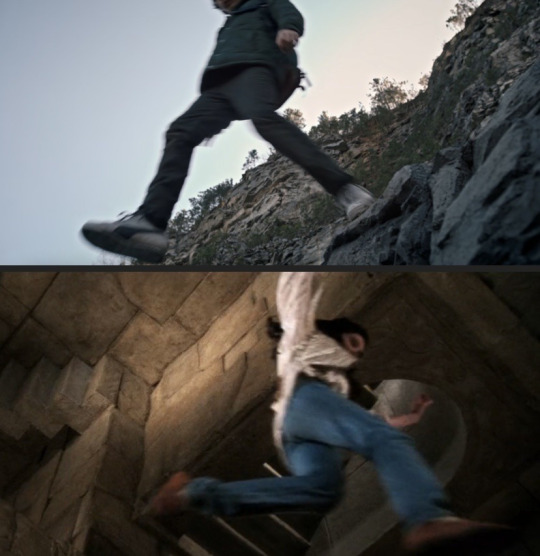
For those that haven't read this theory, please do because I didn’t make these observations myself and the original post goes a lot deeper into the details from Labyrinth, which in some ways align a little too conveniently with the narrative we’re seeing unravel on the show with Mike over the seasons.
For some basic context, in s4, we even get a reference to M.C. Escher’s Relativity hanging on the wall in Mike’s room, which is also on the wall of Sarah’s bedroom, along with that work being what inspired the scene in Labyrinth.
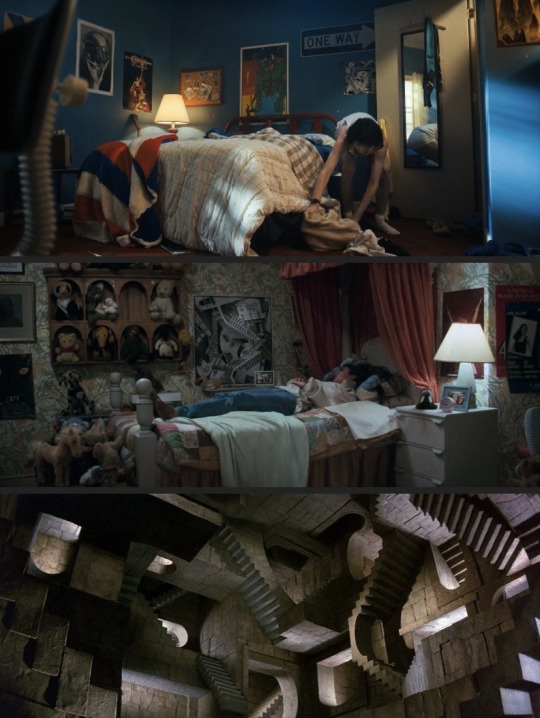
This next part has actually been talked about before quite a bit in the fandom, even outside of tumblr, so it’s not exactly some breakthrough as a concept on its own.
Every season, in the first scene (re)introducing the main characters, Mike is running late in some capacity. In 1x01 it’s around 3 minutes, in 2x01 it’s around 6 minutes, in 3x01 it’s around 8 minutes, and in 4x01 it’s around 13 minutes.
So technically not the literal season opener, as that’s usually reserved to a flashback at some different location, but obviously still within those first 15 minutes, following directly after the opener…
And since we already have an idea of what the opening of s5 is going to be, what do we think the scene directly after it is going to be? You know, in the scene that Mike has been consistently running late in, for four seasons now?
Speaking of 15 minutes, I think that if they were to keep this trend going for the final season (the full circle-ness of it all is honestly too epic to pass up), it’s likely that this final time it will happen around the 15 minute mark of 5x01, as that would make the build up for it each season pretty consistent.
And not only that, but it would also literally be a callback to what Karen says to Mike that first time he’s late in s1:
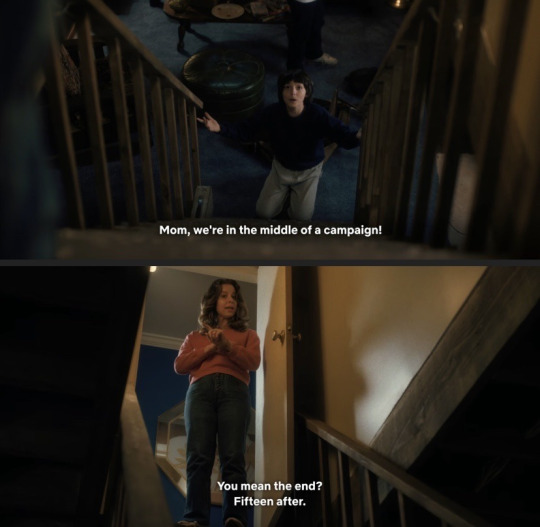
And here’s my other favorite line from one of these scenes, in the context of this theory, because it literally acknowledges this concept directly and with this air of foreshadowing I cannot stress enough:

Interestingly, another detail that ties all these ‘Mike being late’ scenes together, is stairs.
In s1 he’s running up the stairs to convince his mom to let them keep playing.
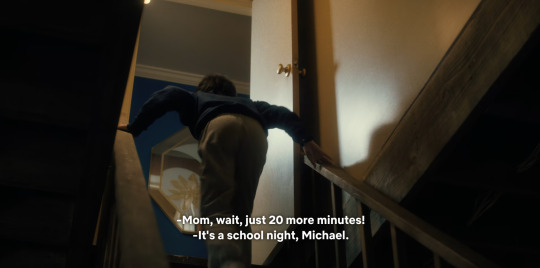
In s2 he’s rushing down the stairs trying to avoid Nancy’s wrath.
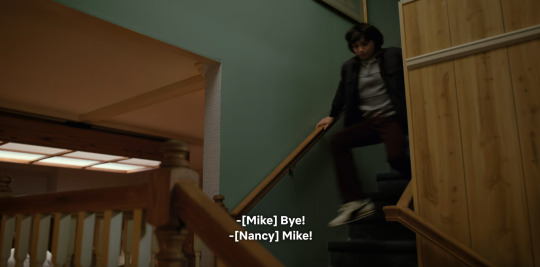
In s3 he’s awkwardly bumping into strangers going down the escalator in Starcourt Mall.

And in s4 he’s hurrying down the stairs on his way to school.
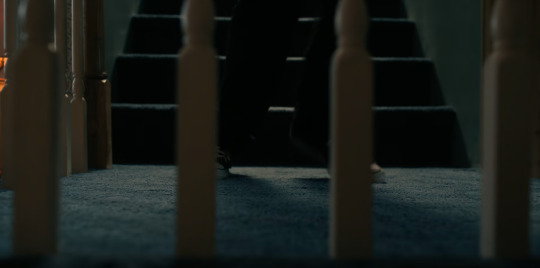
The whole point of Labyrinth is that it’s an allegory for growing up, with Sarah going from dressing up as a princess to reenact one of her favorite fairytales after being chastised by her step-mom for not going on more dates like girls her age, to Sarah rejecting her childhood and it leading to an unfortunate series of events, forcing her to face reality and take responsibility of her own life.
Does this sound like anyone we know?
Mike, who starts the show in s1 playing DND animatedly with his friends before being interrupted by his mom to end the campaign despite protests, to his mom in s2 punishing his bad behavior by having him get rid of some of his favorite toys, to him in s3 insisting that they’re 'not kids anymore' and that it was inevitable for them to stop playing games and grow up and get girlfriends, to him now in s4 reverting back to this earlier version of himself, sporting the Hellfire shirt proudly, to then reverting back to pretending when showing up at the airport with Argyle calling his outfit a shitty knock off (aka calling Mike a shitty knock-off), and without the story ever acknowledging why those shifts happened in the first place, and with one season left?
Hint? Forced conformity. That’s what’s killing the kids. That’s the real monster.
They literally told us already that out of all the monster we've seen in the show, this is what is worse than all of that. Meaning that what is about to go down, most likely topping everything we've seen up to this point, is likely going to involve forced conformity.
I also think it’s interesting that the scene in Labyrinth happened during the climax of the film, because arguably if you were to watch Stranger Things in its entirety, from s1-5, the beginning of s5 is going to feel very much like the climax to the overall story.
Things are going to be happening fast. The stakes are insane because they need to top everything that they’ve done up to this point. Something’s gotta give. And Mike is just not looking safe out here guys.
I could go on and on about all the hints that Mike is danger, but I’ll just share my favorites.
How am I gonna survive a whole week without you guys? Mike says, at the tail end of his opening scene in s4, and with s5 set to start at the end of said week.
Mike sitting in front of an antique funeral home fan in the s4 promotional pictures of the party in the Creel attic.
Nancy saying she saw Mike die in the vision Vecna showed her, with the early stages of said vision coming true as season 4 nears its end.
Mike getting hit in the head with an arrow front and center by Suzie’s brother, in a sequence that was loaded with foreshadowing for the end of s4 (and beginning of s5?).
Watch out dominos. Your dominos are gonna fall. Argyle says, with Mike equally in the frame behind him.
Without heart, we’d all fall apart. Will says, after telling Mike he’s the heart.
A Karen lookalike standing in front of the missing person's board at the end of s4.
Mike’s very first line in the show (also the literal first line in the show) being A shadow grows on the wall behind you, swallowing you into the darkness. It is almost here…
So maybe, theoretically speaking, what we could get by that 15 minute mark going into s5, is Mike running late one last time, and it potentially being a callback to that cliff scene ie. Labyrinth.
Another scene that I think might've been foreshadowing what is currently going down, is Max and Mike both getting knocked out by Billy at the end of s3. Max goes down first and Mike follows right after, though Max is the first to come to and help them both up.
We know Max is unlikely to be separated from the rest of the characters the whole season, that’s just not feasible. She'll at least be on-screen despite maybe not being back with the others right away, even if it’s just a cryptic cliffhanger at the end of 5x01, followed by her returning more consistently on screen after that leading up to her rescue. With the way things ended in s4 though, we need to know where she’s at and get to finding her. Which is why I think at most it will be a 1-2 episode arc.
So maybe, this moment from s3 was a hint about Max and Mike’s impending doom at the hands of Vecna, as a result of not only their emotional states, but also their bonds with El, and them then being isolated for a short time (presumed dead), only to find their way back?
It’s also worth noting Mike was the only person to witness any of Max’s symptoms from the curse prior to her finding out about it, with the camera focusing on him beside her and looking at her worriedly as her nose bled. We don’t know who Vecna’s fourth victim was going to be, because Max threw herself in as bait, but could it have originally been Mike?
I know a lot of people don't like the Mike getting Vecna'd theories or Mike is depressed takes and so if you find yourself in that position, feel free to subtweet away or whatever you need to cope with my nonsense.
I'm not a big Mike is suicidal truther or anything even, nor do I think it makes sense for him to get Vecna'd in the traditional sense like how it happened with the others in s4 because the gates are open. But Vecna still hasn’t carried out his entire plan, a plan that includes Mike dying. And the imagery surrounding it all leading up to this is compelling regardless.
If one shot at the end of s3, with Max sitting in Billy's room while Hopper was in the background saying and yeah sometimes it's painful and sometimes it's sad was enough to hint at her whole depression arc in s4, then Mike being focused on for multiple shots while Hopper was in the background saying But, lately, I guess I've been feeling... distant from you. Like you're pulling away from me or something.-- And I guess, if I'm being really honest, that's what scares me. I don't want things to change, with Mike looking longingly at the Byers house, cutting to Will looking out the car window crying, then cutting back to Mike walking into his mom's arms with a dead stare on his face, has gotta be enough to justify dude going through some shit, which coincidentally matches up with everything talked about here.
Turns out getting to Mike, now that was the key…
Maybe the first episode of s5 is about Mike ending up wherever Max is, somewhere caught in between, and them ‘crawling’ back ie. The Crawl.
Definitely might add some context to that funkopop shot-listing video Ross posted, followed by one other photo a few days later with the caption being that they finished shot-listing for 5x01-5x02. Meaning the initial video posted was likely from 5x01...
#stranger things#mike wheeler#are they cool enough to pull this off?#remains to be seen#but why break a four season streak?#something something fifteen after#something something you’re late. again! we’re gonna miss the opening!#something something running up that hill and smalltown boy having almost the exact same fucking beat#also blankly staring at sadie and finn sitting close to each other in the s5 filming announcement pic#with finn being the only one out of all of them holding a script for the crawl 😀
176 notes
·
View notes
Text
i had some time to chill i took a walk i drank some water i still hate this sequence
fastpass spoilers and sexual assault references ahead
i mentioned a few weeks ago how much i disliked persephone's last interaction with apollo and how the narrative wants to insist that persephone has moved on / healed from her assault, and with the last chapter and fastpass spoilers, it has genuinely just gotten worse. like at this point i can't even fault the characters or their choices, this is 1000% a rachel thing, and i hope her computer crashes in the middle of an eight hour drawing that she hasn't saved ANYWAYS
i don't think it needs to be said that rachel sexualizes her abuse victim. like, there's a reason that hera is naked during her fight with kronos despite kronos being clothed; there's a reason persephone was alone and apollo had his shirt undone when they spoke on the phone before the press conference. it's masquerading as feminine empowerment, but it just seeks to emphasize how rachel sexualizes abuse, and how she will still try to redeem these male characters.
it's very telling that while she's having kronos monologue how sad and abused he was, and how he was ruled by fear, we cut to a shot of apollo and eros with the love arrow - another plot point that drove me absolutely bonkers but we'll get to that. the placement is not random, for all that it feels it; she's trying to draw a connection between apollo and kronos, how they're both ruled by fear.
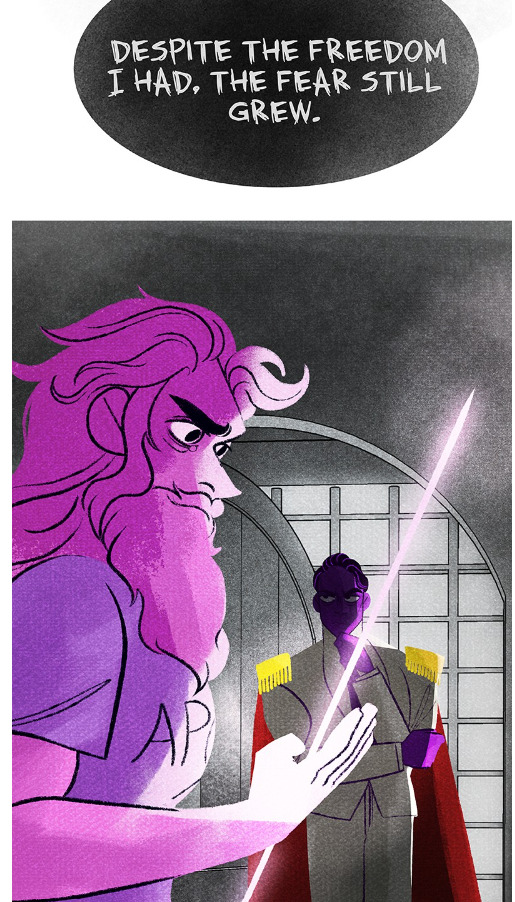
apollo is planning to assault persephone again. this is not me being dramatic or exaggerating - he knows what the arrow does, he knows persephone hates him, he is absolutely planning to assault her again for his own purposes. whether kronos' apology was intended to be sincere or not, placing apollo in the visual middle of it sets a tone. he has abused persephone in the past and he will abuse her again.
the next time apollo and persephone interact, persephone has figured out how to make spring again (somehow, without explanation, one trainwreck at a time i guess.)
i don't love her plan, and i don't love how it came about, but on the top ten list of crimes in this webcomic, it's not the worst. persephone plays up her "weak, damsel in distress" image to apollo so he'll underestimate her - fine, whatever, not the end of the world. it's how rachel depicts this that i take issue with.
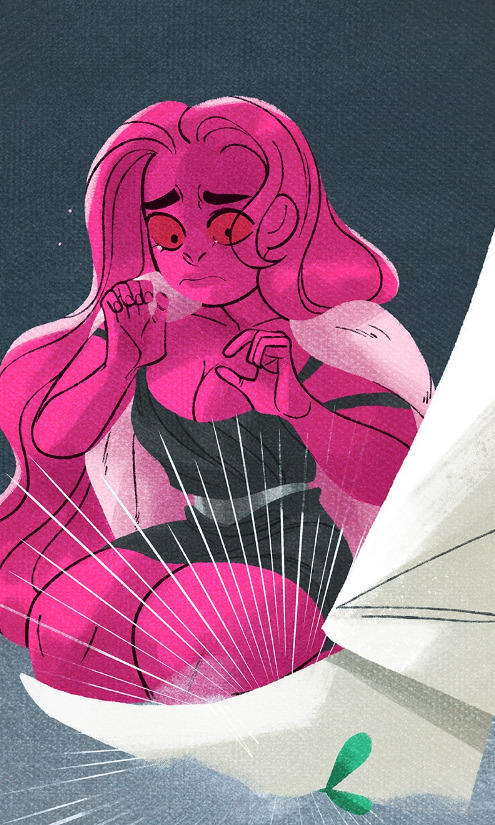
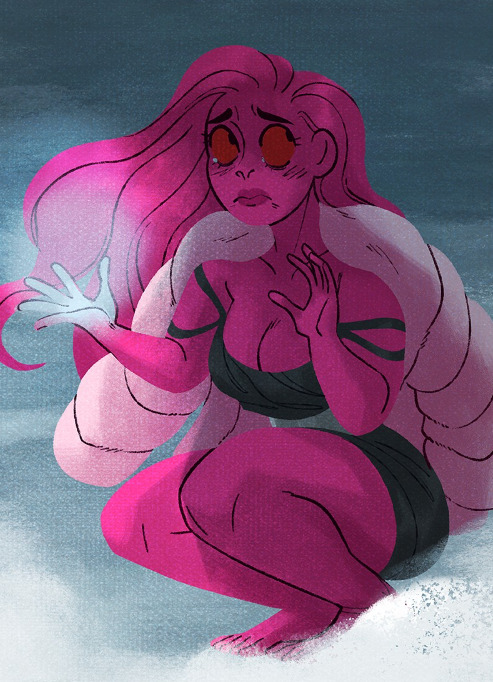
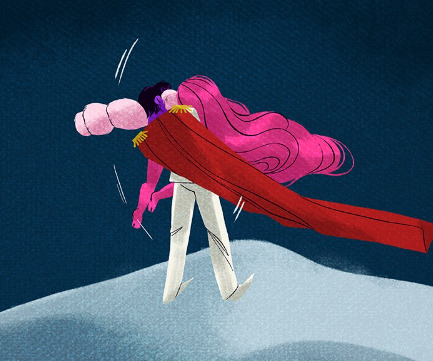
it took me a couple of minutes for that last picture to realize they're supposed to be struggling because it genuinely looks like they're making out lmao thanks rachel i hate it
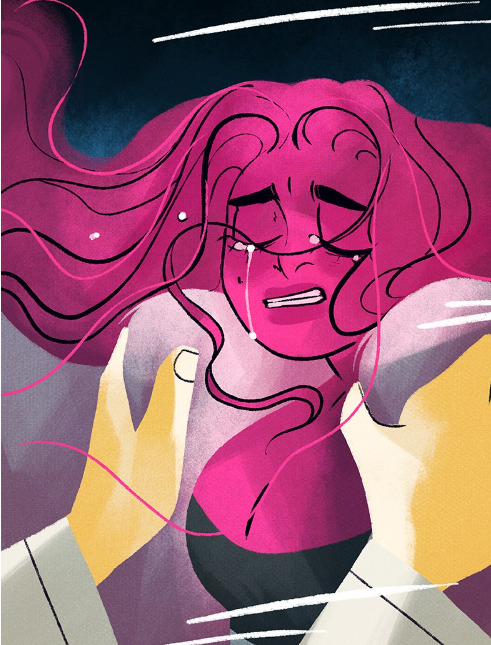
not entirely related but the way the lineart becomes minuscule except on the face and chest rachel really shows her priorities
i'll skip a few more panels of apollo manhandling persephone with her doing pretty much nothing to fight back - she alternates between pleading with him to listen to her when he has historically never done so, and threatening to expose him for the rape, which also historically has never worked, but that's about the extent of her fight back. this is all before she knows about the arrow, so i'm hesitant to say she's playing him with her distress; this is genuinely the extent of her fight back.
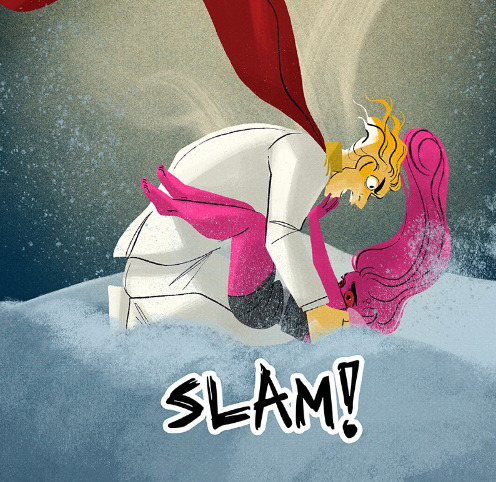
a clear callback to the assault, which in another author's hands might have succeeded in being harrowing and traumatizing for the readers, but just filled me with visceral anger.
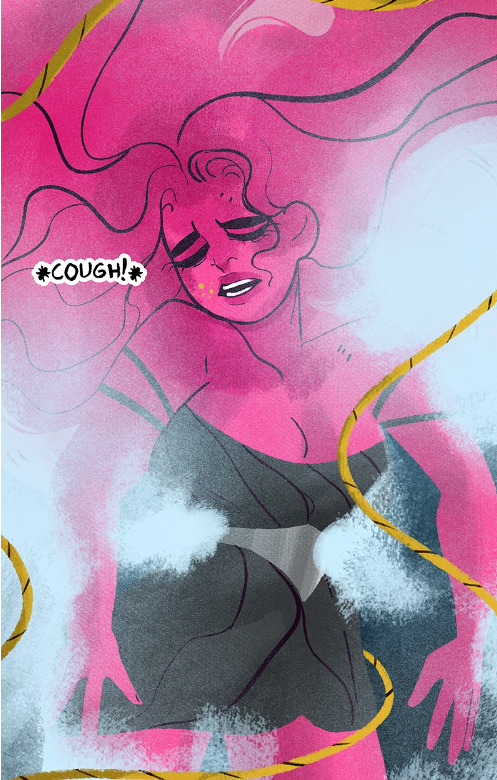
[narrator voice] fucking yikes!
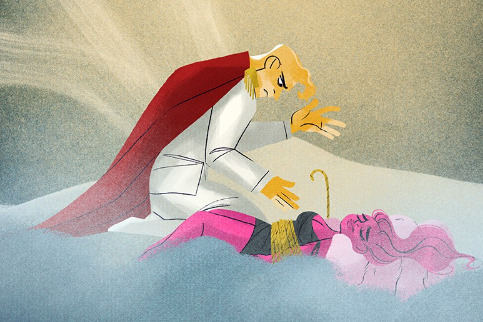
ties her up, but don't worry! her chest will be on prominent display no matter what.
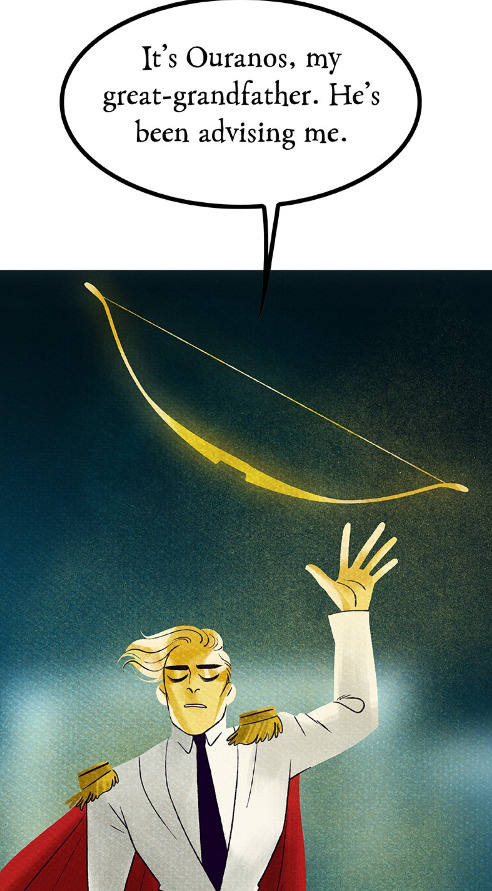
unrelated tangent once again but i love! how rachel has retconned the narrative so that ouranos was manipulating apollo all along! instead of apollo owning up to being a shitheel, we've got a master manipulator in the background, who can take some of the blame for apollo's actions! cool!!!
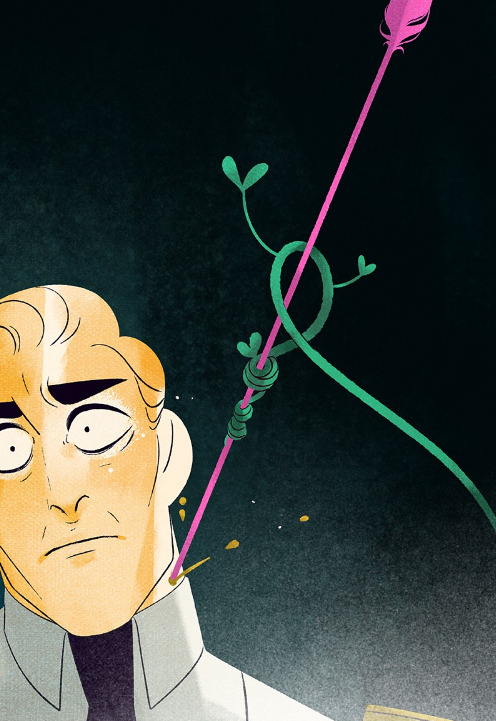
anyways persephone's plan is to make apollo fall in love with her, so he'll feel bad about raping her.
that's it.
we don't get persephone defeating apollo. we don't get persephone getting actual justice. it takes apollo being under the control of magic to admit what happened - it's a cheap cop-out, a lukewarm offering at best. i'm not joking, either, in the fastpass apollo quite literally goes on live television and admits he raped persephone, because he's under the magic of the love arrow. not because he genuinely feels bad, or because persephone got justice - it's a deus ex machina to wrap up the assault plotline. rachel never figured out if apollo was a master manipulator or some idiot tool, so she swerves between both, and then tosses the plot out to make room for something else.
it's such a miserable, cheap conclusion to a storyline that so many women have dealt with. years of waiting for apollo to be brought to justice, and he goes out with a little whimper, and persephone's assault gets swept under the rug again.
what a disappointment.
#anti lo#anti lore olympus#this got long so it's under a readmore#image heavy as well sorry mobile users#assault ment /#the lows we sink to are unfathomable but rachel keeps digging
80 notes
·
View notes
Text
Okay I’m going to talk about The Well because I’m autistic and have a lot to say
So
Midnight sequel. I lowkey always wanted one but also knew at the same time it would never properly do it justice. I believe I was right but that doesn’t mean I didn’t smile with nostalgia when they said the planet used to be made of diamonds.
At first I thought it might be referencing The Satan Pit (the huge hole in the ground, people going mad, it had to have been at least a callback). But that twist was nice. The acting was great from Ncuti like always, he did an amazing impression of David Tennant in Midnight, he captured it perfectly.
However.
Why.
I sorta get why, like it’s supposed to be unknown to the audience and the fact that it said his name is a WOAH thing and that it knows way too much so we can’t hear it but I felt like it was shocking the doctor for the sake of shocking the doctor, as a narrative point of view. I don’t know, that might grow on me eventually
The spacesuits really confused me lmao. Idk if I missed anything but the doctor and Belinda immediately having the exact right spacesuits they needed from the Tardis’s dressing room was strange. But hey it’s doctor who I don’t care that much, I’m here to be entertained not to understand things
Rose was great in my opinion (I’ve always liked her acting) and I’m glad she got to shine on doctor who. Not much to say about that apart from I’m glad there’s more deaf rep on tv, it’s very close to my heart
Belinda is an icon and I love her. The fact that she made a visual cue for the how the midnight entity was working made me piss myself. It thought it might add more but it was like Mr Maker explaining it. It was stupid and I love stupid. Probably not meant to be stupid but idc. Also.
POOR BELINDA!! GIRL JUST WANTS TO GET HOME AND SHE DIED???? Yeah she got brought back but fucking hell she got shot and died. She had an entity whispering in her ear and was sure she was gonna die and then she died!! Traumatising
Ok the sacrifice.
I won’t lie, I can’t remember the names of the side characters but that’s probably because I was sleep deprived and I have an awful memory. But I loved the parallel of the woman sacrificing herself at the end compared to the hostess with no name. We get this woman’s full name and her back story, we know who she is and we know her motivations and we even see a flashback of her as a kid. This contrasted with the hostess nobody knew anything about, even her name, was great for me. It was heartbreaking that she died but she died being known. I don’t have a reason why I liked it but I did.
The episode reminded me of The Satan Pit from the start and even a little of Oxygen but idk why. It also reminded me of The Doctor’s Daughter but I can’t remember why.
But yeah I actually liked it. Sure it’s never gonna live up to Midnight but I enjoyed watching it and I’d watch it again. I might watch it tonight to see what i missed the first time
Also very excited to see Ruby next episode and what slightly, to my sleep deprived mind, looked like the Dot and Bubble monsters? (Not the racists, the slugs)
OH YEAH FORGOT TO SAY, I LOVE THE CALLBACK OF TURN LEFT WITH THERES SOMETHING ON YOUR BACK I KEPT THINKING IT THROUGHOUT THE EPISODE
#doctor who#doctor who spoilers#spoilers#shhh spoilers#doctor who season 2#ncuti gatwa#the 15th doctor#doctor who the well#i have a lot to say about the episode#and I’ve said it#just what I think#I’ve probably missed a load of shit and haven’t grasped the episode perfectly but I’ll rewatch it#I’m not perfect lol
14 notes
·
View notes
Text
Imagine with me a Greek tragedy in a fantasy steampunk setting with groundbreaking and supremely creative animation, phenomenal voice acting, and an absolutely banger original soundtrack and some of my all time favorite fight choreography ever. Not only is every single character complex and morally grey, but the narrative also recognizes this and respects it. It is absolutely full to the brim with symbolism, metaphors, foreshadowing, callbacks, parallels (visual, thematic, and all other kind of possible parallels you can imagine) and each and everyone of these are used expertly. Maybe even perfectly. It has storylines and themes that are both wide and far reaching, but also just so incredibly personal and intimate. The relationships are so complex, with a special focus on the relationships between sisters, fathers and daughters, and found family. A lot of heart and love went every single moment of this series and it shows
For caitvi specifically on the surface they get grouped together with ships like korrasami and supercorp a lot. So that’s their basic vibe, but there’s a lot more to them than that. They are just about the perfect battle couple. They start off as reluctant allies (with immediate chemistry) which quickly evolves into a real partnership. They see each other. They understand each other. These are two of the toughest women in the world. They have to be strong. They are the only ones that they can be vulnerable with. THEY ARE SO SOFT FOR EACH OTHER. And that’s all within about three days of meeting each other (the last 2/3 of season 1). By the time season 2 comes around, they are all each other have. At least before this Vi was trying to reunite with her sister and Caitlyn had her parents and Jayce, but now there’s only each other. They argue and become a little bit too dependent on each other. While they were bringing out the best in each other in season 1, they’re now bringing out the worst in each other for the first 3 episodes of season 2 (get you a ship that can do both). They’re opposites. Vi literally refers to them as “oil and water” in season 1. But they’re also the same. All they know how to do is to fight and to never stop no matter what. They both love their family’s so much. They both heal and destroy each other. They’re great and I love them
There’s also a lot of hot characters
So yeah, I’d really recommend this show @juanabaloo
#arcane#i think I did pretty good about leaving out spoilers#caitlyn kiramman#vi arcane#caitvi#piltover's finest#show recommendations
24 notes
·
View notes
Text
one time dad egbert punched me in the face. it was awesome
(page 1137-1144; some troll and Midnight Crew theories)

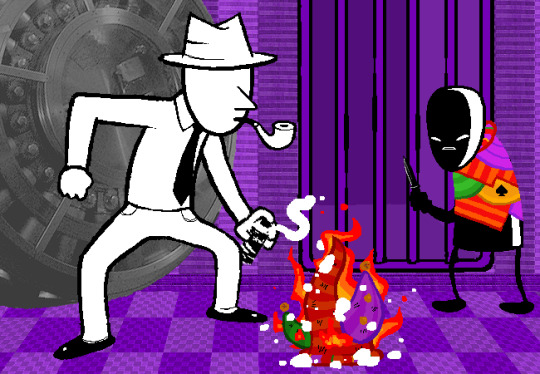
I now know exactly what it feels like to get punched out by Dad Egbert. In a page that should definitely come with a photosensitivity warning and is the most abrupt, unexpected transition in the comic so far, we become Jack and get WHOPped in extremely dramatic fashion.
I like two things about this! First, even though the title doesn’t indicate that we ‘are’ Jack, that ominous shade of purple in the background and the red and orange of the word bubble matching the harlequin hat visually indicates who and where we are. And second, after the ‘psyche!’ pages scattered through Act 2, I’ve noticed that Act 3 has been perfecting seamless transitions where the narrative uses a pesterlog or visual parallel to move from one character to another. Some examples are the Jade to Rose pesterlog transition in pages 837-839, the Rose to PM timer transition in 869-870, the Jades to PM visual transition in 1032-1035, and the Rose to Dave gifts transition in 1093-1095. Having gotten used to those, I actually enjoy how aggressive and nonsensical this feels, especially as Jack is kind of ridiculous as a character and he is in this antagonistic relationship with Dad.
I had assumed that Jack killing John’s dad would be forbidden – kidnapping a Sburb player’s loved one and holding them hostage pressures the player to go the ominous planet and save them, even though it’s a dangerous place they’d otherwise want to avoid. Killing Dad, while tragic for John, wouldn’t be as effective from an evil game designer perspective.
Page 1140 is a callback to page 90, the first Strife page, and to Dad’s lighter gambit! Of course as a pipefan413 he needs to carry a lighter at all times. And of course as a harlequin enthusiast he knows those jester hats are going to be flammable. As for the shaving cream, I did some research and according to this video Barbasol, which is what Dad Egbert uses, isn’t flammable. Other sources say that shaving cream itself isn’t flammable, but the propellant mixed with it in pressurized spray cans generally is. So I’m not sure if Dad was trying to extinguish the fire (because he’s a sensible guy who cleans up after himself, and prefers harmless pranks to actual damage) or if he was trying to heighten it (because Jack was trying to attack him with a knife so things are way beyond ‘prank’) and it didn’t work. The Dad Egbert mysteries will never cease.
Jack letting Dad go is another mystery. Obviously, Jack thinks they have a shared hatred of the jester hat, and is grateful to Dad for destroying it – so is this a moral code of Jack’s, a favor for a favor? A sign of respect for Dad’s far more sensible hat? Or is this just about the amount of problems Dad is causing, and Jack’s just giving up? Either way, Jack is apparently going rogue. He’s going against his orders to wear the hat AND to keep Dad imprisoned, and he’s sure to get in serious trouble with the monarch.
Jack is honestly a fascinating character, but so is pretty much every character in Homestuck, so it’s hard to decide who I most want to learn more about! Jack seemed so hard-boiled and rule-following in his first few pages, immediately donning the hat despite his displeasure, and following standard procedures to contain Dad, but apparently this was the last straw he needed to totally boil over. Could this maybe, possibly be the thing that pushes him to leave his position, go hide out in an underground bunker with a few of his trusted associates, and begin some ‘nefarious plots serpentine in complexity’ (p.328)??? Spades Slick does have a knife in his inventory (p.329) but it doesn’t look exactly like the one Jack uses on Dad (p.1139), so maybe there’s a few more steps in between, but surely we’re going there. SURELY.

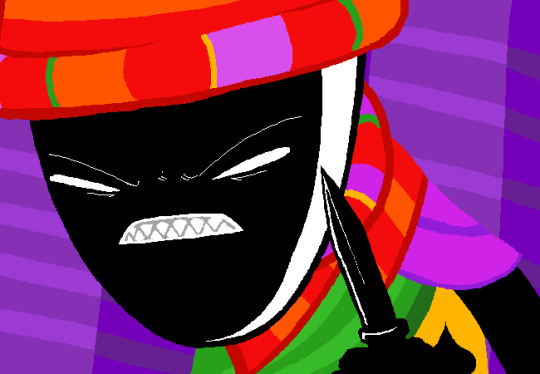
So what is Dad going to do next? He’s escaped, but surely a lot of people will be trying to recapture him. And he probably wants to look for John, but I don’t know where he’d even begin. Even if he found someone friendly, would he know how to communicate with them? How will he figure out that John isn’t even on this planet? I would like to see a parallel scene to Jade exploring Prospit where Dad explores the ominous planet, and I’ve previously theorized that the trolls are currently on the ominous planet. And they definitely speak English, so, could this be how we physically meet a troll?
And, as the trolls might have access to extratemporal wifi (thanks @foxgirlbeans for coining that phrase), is it possible that one of them is making the Midnight Crew comic based on real events on the ominous planet and posting it to the Earth internet as fiction? This could explain how a caricature of John is also present in the Midnight Crew (p.831) and why he’s referred to as GT there, as the trolls haven’t been able to relocate him since he changed chumhandles, so they’re guessing how his Sburb session is going instead of knowing for definite – or perhaps GA has gotten some information on the session through Rose. It would also make a great parallel between Dave making SBAHJ and whichever troll makes MSPA.
Based on what we’ve seen so far, I don’t think adiosToreador – the only troll we’ve seen Dave talk to – is capable of making a successful webcomic. None of the chumhandles jump out to me as ‘Midnight Crew author’, but apocalypseArisen and twinArmageddons have similar religious undertones to Godhead, and terminallyCapricious contains the word ‘terminal’ – like a Sburb command terminal, something that plays with the fourth wall, or like technology as in ‘turntech’. So if I had to put out a wild guess for this red string theory, it’s one of those three.
> Dad: Go and make a new friend.
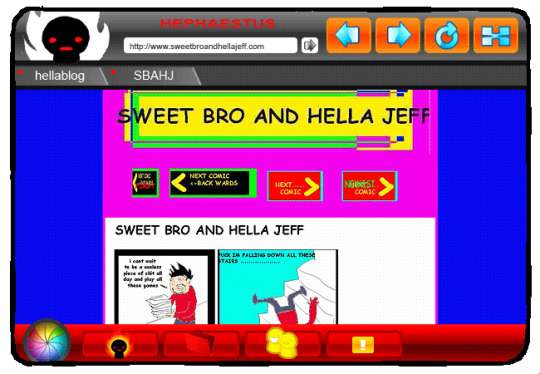
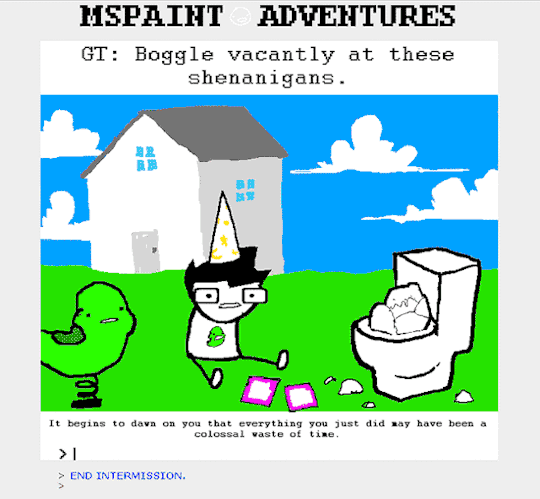
#homestuck#reaction#hee hoo looking at the final nfl standings for the season and THREE teams have a 4-13 win-loss record#sick homestuck reference yall#chrono
18 notes
·
View notes
Text
Perfect scene.
In Episode 10, June and Nick are once again in a car, a familiar setting that has silently witnessed so much of their shared history. But this time, everything is different. June sits in the front seat beside him, no longer tucked away in the back as she was when their relationship first began in secret back in Season 1. Behind them, their daughter rests, a quiet symbol of everything they’ve been through and everything that has come from their love, both the joy and the devastation. Therefore, an hopeful ending.
This moment is rich with emotional and narrative echoes. In the early seasons, especially Season 1, the car was a space of concealment, intimacy, and unspoken yearning. Nick was the ever-faithful driver (literally and metaphorically), quietly facilitating June’s movements, offering her brief moments of freedom or connection in a world that sought to control every part of her. He was her safe space in a regime designed to dehumanize her. Their early encounters were defined by silence and stolen moments in the shadows. Their entire relationship began in a car, filled with tension, stolen glances, and unspoken emotions. And now, years later, they're here again, but everything has changed.
Even in the poignant scene of Episode 4x09, when June takes the wheel to meet Nick, we witness the undeniable progress of her agency and the enduring pull of their connection. Her drive underscores how deeply their separation affects her, a constant longing that shadows her freedom in Canada, tethering a part of her still to Gilead, to Hannah, and to him.
The cyclical nature of their story is further emphasized by callbacks throughout Season 6. Nick wearing driver's clothes. We see echoes of past dynamics, such as Nick in the front and June in the back, a visual reminder of his consistent support. Even in the heartbreaking breakup scene, the shared glances through the rearview mirror, reminiscent of moments in Episode 8, underscore the enduring, unspoken bond between them.
Now, as the series draws to a close, this scene repositions their dynamic. June in the front seat suggests a shift in agency — she’s no longer the passenger, no longer in hiding. She’s a mother, a fighter, and someone who’s made impossible choices, now she sits beside Nick as an equal partner in their shared reality. That their daughter is physically present adds a profound layer of poignancy. This is no longer just a story of romance — it’s a story of legacy, sacrifice, and the unbreakable bond forged through pain and love.
It feels like everything is coming full circle. The car, once a symbol of confinement and secrecy, now holds a family. And somehow, through all the pain, loss, and distance, they’ve found their way back to each other.
This final scene, where they are together again, driving forward with their child behind them, feels like the culmination of a long and winding emotional journey. It’s quiet, tender, and deeply tragic, because we sense that this moment - like so many between them - for closure. Their love has always existed in the margins, in the spaces between violence and survival, between freedom and captivity.
From secrecy to tentative hope, from powerlessness to bittersweet agency, their story has always been cyclical, always mirroring the push and pull of fate and circumstance.
It’s the kind of storytelling that lingers - melancholic and meaningful. This is the kind of scene that doesn’t scream for attention but devastates quietly, with its loaded silences and subtle callbacks. I’ll be thinking about it, and grieving it, for a long time, because in a world that gave them so little, they still found a way to love.
And that love, however impossible, was always real.
Full circle. I will cry until the end of my days.
#being delulu is my hobby#the handmaid's tale#osblaine#nick blaine#june osborne#nick x june#someone write me fanfic#someone rescue Hannah I want her there too - I hate TT#girl can dream#i will add screenshots later
14 notes
·
View notes
Text
guys you don't understand, this song (especially with context) has taken over my brain heeelpppp—
youtube
this entire freaking album is just hecking amazing, but this. Song. Guy ticked off Poseidon, both sides are morally grey, and this confrontation is the most powerful and emotionally-charged curb stomp I've ever witnessed in a piece of media.
The anger. The power. The nuance. The callbacks. The fact that you can visualize the carnage. The emotional damage.

I just. I can't. You guys. This. [emotional keysmash] Narratively, lyrically, musically, production quality, everything, this song is a masterpiece among an album of masterpieces.
oh and here's an animatic that makes it hit even harder.
youtube
#epic the musical#epic the ocean saga#the ocean saga#ruthlessness#the odyssey#odysseus#poseidon#music#the brainrot is real#alassë rambles#animatic#Youtube
28 notes
·
View notes